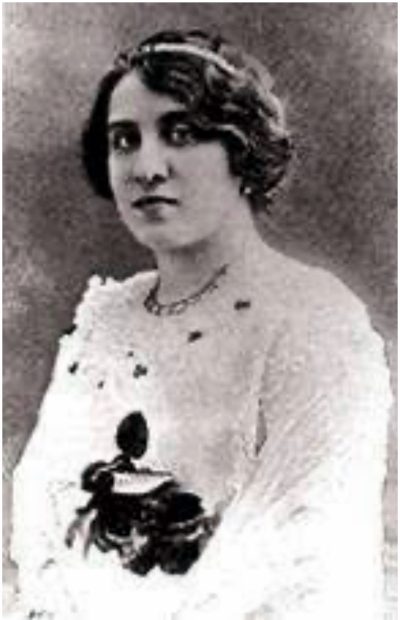María Piedad Castillo de Levi (Guayaquil, July 6, 1888 – Quito, March 4, 1962) was an Ecuadorian writer, poet, journalist, and feminist. She fought for women’s suffrage and co-founded Nuevos Horizontes, a feminist magazine. Castillo studied at the Sorbonne in Paris and later worked for El Telégrafo Literario. A delegate to the Inter-American Commission of Women from 1940, she also joined the House of Ecuadorian Culture and traveled widely, contributing to international media. In 1962, her poetry collection Poemas de Ayer y de Hoy was published.
Early Life and Education
María Piedad Castillo de Levi was born María Lucía Castillo Castillo on July 6, 1888, in Guayaquil, Ecuador. She was the daughter of José Abel Castillo, a prominent journalist and owner of the newspaper El Telégrafo, and María Blanca Bethsabé Castillo Martíz. From a young age, she showed a talent for poetry, studying under the notable educator Luis Wandemberg after finishing her primary education at the Martínez Mera School. As higher education was not widely accessible to women at the time, she received much of her intellectual training informally, learning from her father’s colleagues at El Telégrafo. She began working at the family’s newspaper in 1906, where she honed her skills as a writer and editor.
In 1912, she traveled to Paris to study at the Sorbonne’s Faculty of Philosophy and Letters, marking the beginning of her formal higher education. However, she returned to Ecuador in 1914, prompted by the onset of World War I. During her time abroad, Castillo also served as a volunteer nurse with the French Red Cross.
Personal Life
In 1915, María Piedad married José Roberto Levi Hoffman, a Sephardic Jewish chemist from Germany. The couple had begun their courtship five years earlier with an exchange of languages—he taught her German, and she taught him Spanish. They had several children, including Graciela Levi Castillo, who would later become a journalist. José Roberto Levi Hoffman became an Ecuadorian citizen in 1937, as anti-Semitic persecution intensified in Nazi Germany. He played a key role in advocating for Jewish refugees, helping to persuade the Ecuadorian government to allow Jewish migration during World War II.
Literary Career and Feminism
María Piedad Castillo de Levi was an influential writer, poet, and journalist, as well as a passionate advocate for women’s rights. She contributed poems and articles to El Telégrafo and other magazines throughout her life. Her literary output blended romanticism with modernist influences, a style that earned her respect within Ecuador’s literary circles. Her poems, such as La Campana Mayor and El Abanderado, won national prizes in the early 20th century.
Her activism for women’s rights became a defining aspect of her life. In 1932, she co-founded the Legión Femenina de Educación Popular (Women’s Legion of Popular Education), an organization dedicated to improving the rights of women workers. The following year, she launched Nuevos Horizontes, a feminist magazine that served as the organ for the Legion. Castillo’s activism extended to suffrage: she famously led a suffragist march in Guayaquil in 1924, demanding the right to vote for women. Despite her candidacy for Minister of Education in 1935, Castillo was denied the position due to widespread exclusion of women from politics at the time.
Her advocacy was not confined to Ecuador. Beginning in 1940, she served as the Ecuadorian delegate to the Inter-American Commission of Women, a position that took her to various international forums. Castillo was also an active member of the National Press Club in Washington, D.C., where she lived for extended periods.
Legacy and Recognitions
María Piedad Castillo de Levi’s work as a feminist and writer was widely recognized during her lifetime. In 1955, she was declared “Woman of the Americas” by the Unión de Mujeres Americanas, a significant honor reflecting her contributions to both literature and women’s rights. That same year, she was honored by the Ateneo Ecuatoriano in Quito. In 1960, she was recognized by the Unión de Quiteños.
Her poetic work culminated in the 1962 publication of Poemas de Ayer y de Hoy by the House of Ecuadorian Culture. This collection stands as a testament to her contributions to Ecuadorian letters, blending personal experiences with broader social and political themes.
Death
María Piedad Castillo de Levi passed away on March 4, 1962, in Quito due to a cerebral embolism at the age of 73. She was buried in her family’s mausoleum in Guayaquil, leaving behind a legacy as a pioneering feminist, intellectual, and poet.
Works
- Poemas de Ayer y de Hoy (1962)
References
- Pérez Pimentel, Rodolfo. “Castillo de Levi, María Piedad.” Diccionario Biográfico Ecuador, https://rodolfoperezpimentel.com/castillo-de-levi-maria-piedad/. Retrieved September 22, 2024.
- Wikipedia contributors. “María Piedad Castillo de Levi.” Wikipedia, The Free Encyclopedia, https://es.wikipedia.org/wiki/Mar%C3%ADa_Piedad_Castillo_de_Levi. Retrieved September 22, 2024.
- Enciclopedia del Ecuador. “María Piedad Castillo de Levi.” Enciclopedia del Ecuador, https://www.enciclopediadelecuador.com/maria-piedad-castillo-levi/. Retrieved September 22, 2024.

